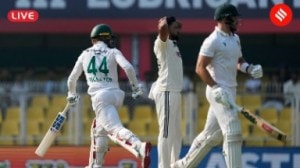Britain’s Olympic gold harvest: lottery that took no chances
From one gold to 18 in 12 years, London is ready with its springboard for 2012

When the Indian contingent arrives from Beijing with three medals, sports administrators in New Delhi, after the cheering and the celebrations, may like to look at London for an answer to what creative planning, innovative funding and accountability can do.
Take British cyclist Chris Hoy. In 1996, he travelled to Moscow for the European Under-23 Championship with his own bicycle and with one set of spare wheels. Britain’s cash-strapped cycling governing body couldn’t afford to send an accompanying official and after his return from Moscow, Hoy had to return his tracksuit so that it could be used by other cyclists.
Now 32 and almost at the end of his career, Hoy is enjoying an unprecedented harvest of Olympic golds in Beijing.
With three gold medals, Hoy became Britain’s most successful Olympian — the first to get three medals in a single Olympics since Henry Taylor in London 1908. “It’s an unbelievable feeling to achieve the absolute maximum you possibly can,” he said.
Similar success stories have been coming from all quarters of Britain’s Olympic contingent. Things got off to a perfect start when 19-year-old Rebecca Adlington won gold in 400 m freestyle and, a couple of days later, created a sensational world record to win the 800 m freestyle. In those moments of glory, she went from being an unknown athlete to the greatest British swimmer in 100 years. “If somebody said to me that I would win two Olympic golds, I would’ve laughed,” said Adlington, still crying in disbelief.
In cycling, Britain swept seven of the 10 golds. In sailing and rowing, it got another four. With a total of 18 golds, 13 silvers and 13 bronze medals, Britain is now third in the tally behind hosts China and the US, and has jumped past arch rivals Australia and Olympic giants Russia and Germany.
It’s been hard to believe for experts that this is the same team that had become a laughing stock after winning just one gold in Atlanta 1996. So, what changed in the last 12 years?
The revival of Olympic sports in Britain had a small beginning in 1994 when Prime Minister John Major, unable to find government funding for arts and sports, hit upon the idea of using funds from the National Lottery. As money started pouring in, UK Sports — the highest governing body in the country — devised a World Class Performance Programme (WCPP).
Half the money spent on this programme came from the Lottery, with the balance being made up by government grants. The WCPP is a public document and reads like any boring, bureaucratic paper at first glance. Among other things, it states: “Total Beijing Olympic investment 2005-2009 — £75 million. Predicted medal return on investment 35 and predicted medallists required 60.” That’s the British way of doing things — investment requires mandatory returns — and with 39 medals so far, they are well ahead of the target.
Several existing sports administrators were asked to quit and everybody had to appoint a performance director, who had to meet certain targets. They were told to use a no-compromise approach to identify athletes with potential to win medals in Beijing. The athletes were to be given the best training with best support staff recruited from all over the world. The average annual expenditure is estimated to be £45,000 per athlete.
According to sports psychologist Karl Morris, “No longer were there worries about paying basic bills and juggling jobs with training. And that has been fundamental to our improvements. Take the cycling team — Lottery cash enabled them to go anywhere in the world to train and to poach coaches from Germany and even Australia.”
And this has been noticed in Beijing. When other teams were busy fixing their bikes, British cyclists were talking to their psychologists while a huge gathering of technicians, engineers and specialists were ensuring optimum performance from their state-of-the-art kit.
The associations that have not shown results are going to have tough time in a wide-ranging review. By December, UK Sports will have funding plan ready for 2012 London Games. Besides Christine Ohuruogu’s gold in the 400 meters, there were few returns from athletics, which received £26.5 million. Searching questions will also be asked of archery, shooting and judo, on which £2.8 million, £5.1 million and £6.9 million was spent.
“This is an excellent springboard to 2012, but the bar is being raised ever higher by our performances and and public expectation,” said Britain’s Olympic Minister Tessa Jowell.



- 01
- 02
- 03
- 04
- 05




























